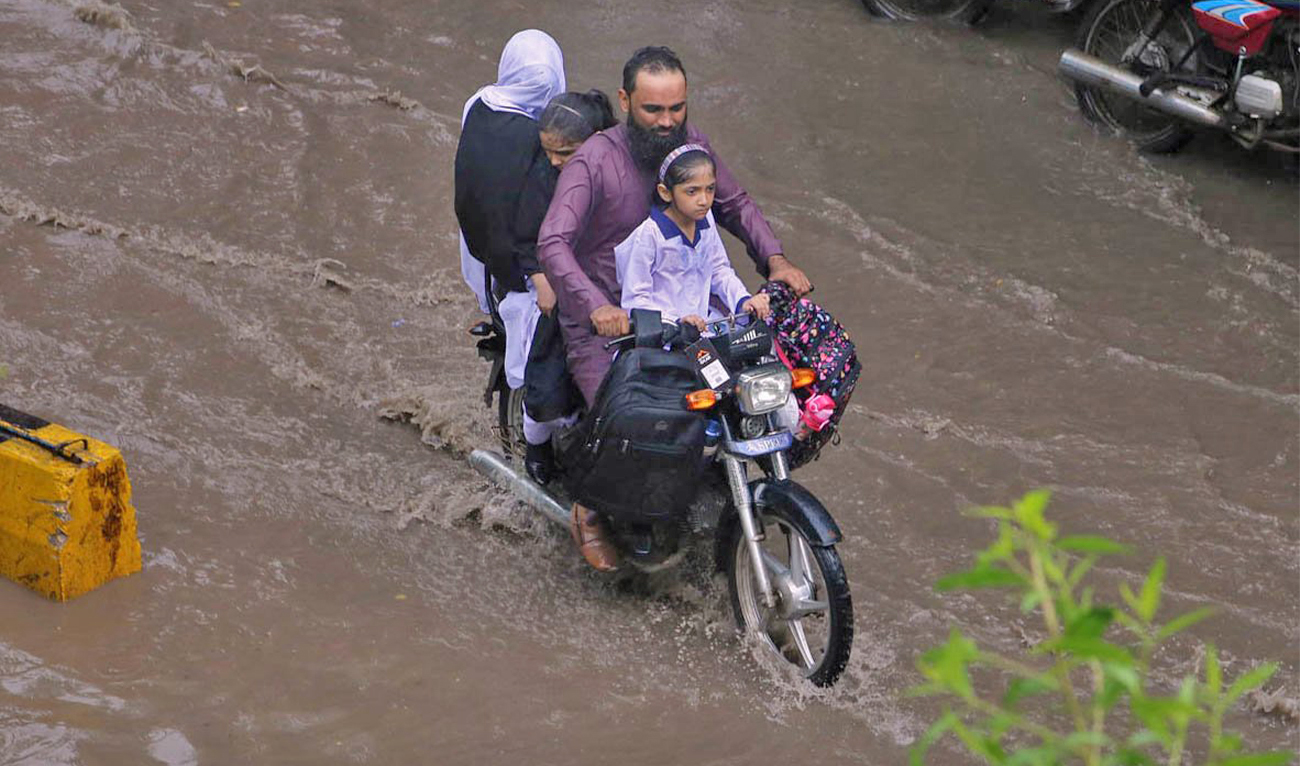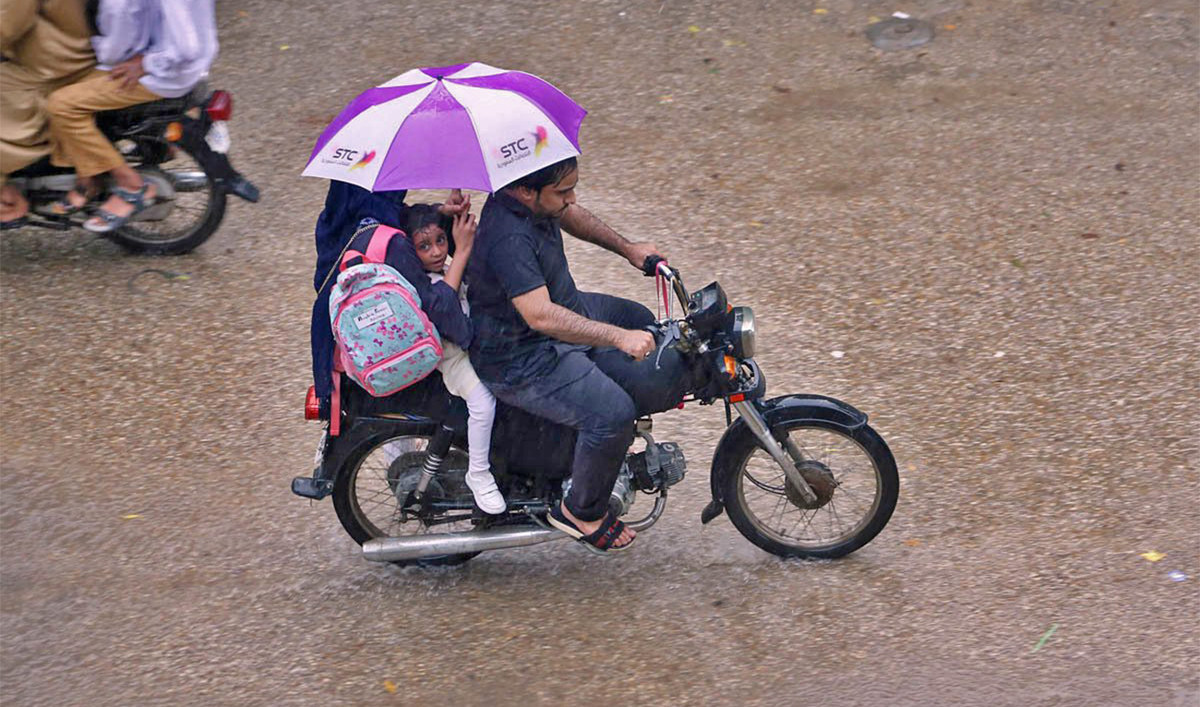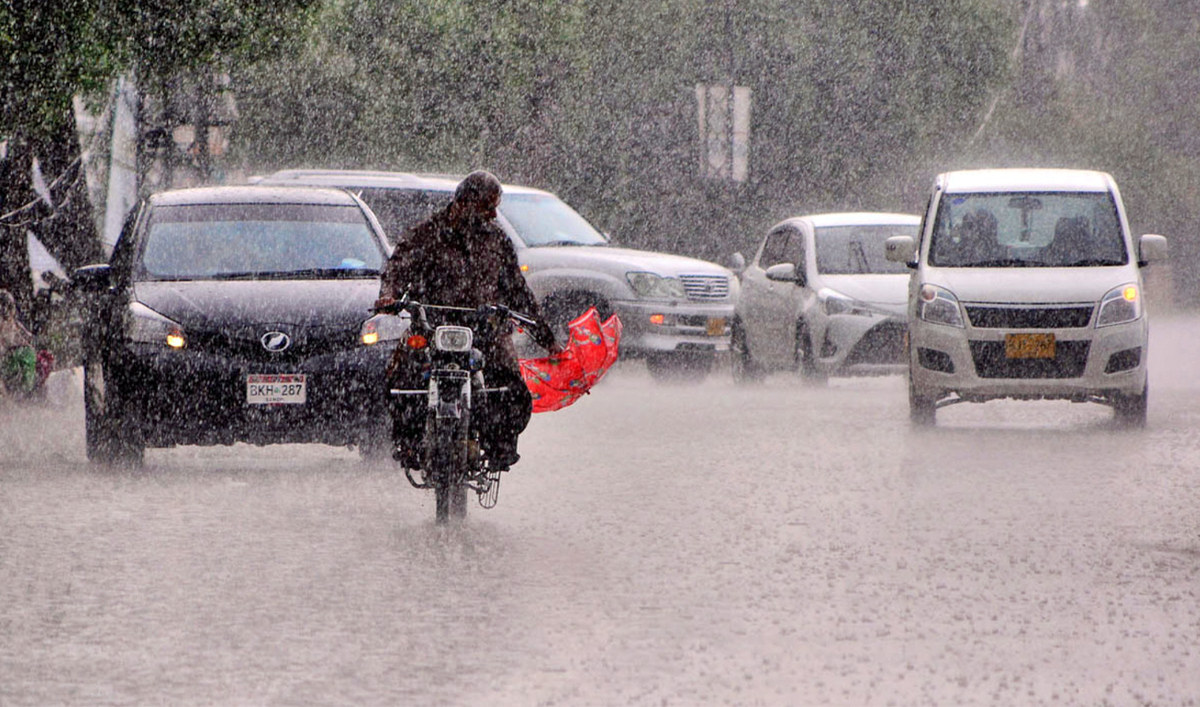KARACHI: The bodies of two children were recovered while five others, including their parents, were still missing on Thursday evening after the family's car was swept away in a flash flood in Karachi, rescuers said, as rain beat down in the capital of the Sindh province.
Flash floods caused by abnormally heavy monsoon rains have killed 674 people in Pakistan since mid-June, with remote communities in the impoverished southwestern province of Balochistan among the hardest hit.
On Wednesday, as the Pakistan Meteorological Department (PMD) warned heavy rains could trigger flash floods across Sindh, authorities announced that schools would remain shut across the province on Thursday.
In Karachi, besides the two children who were swept away in the car, another five people including two children lost their lives in the last 24 hours, mostly in incidents of electrocution, police surgeon Dr. Summaiya Syed told Arab News.

A man in Pakistan's Hyderabad city takes children to school on a motorcycle amid heavy rainfall in the southern province on August 17, 2022. (APP)
The National Disaster Management Authority (NDMA) said total rain deaths Since mid-June had reached 674.
"Body of two children, Muhammad Moosa, 10, and Hamna, 7, have been recovered whereas the parents and other sibling are still missing," Saad Edhi from the Edhi Foundation told Arab News, adding that rescuers had pulled out the car of a family that was traveling from Karachi to Hyderabad before it was swept away in rainwater.
Over 1,128 people have been injured since June 14, as per the National Disaster Management Authority. Balochistan has been the hardest hit province so far, reporting 202 casualties and 81 people injured.
In Pakistan’s southern Sindh province, 149 people have died and 573 are injured, Punjab has reported 144 deaths and 290 injured people while Pakistan’s northwestern Khyber Pakhtunkhwa province has reported 135 deaths and 161 injured since June 14.
Thirty-four people have been killed and 19 injured in Pakistan’s Azad Kashmir northern region while nine people have been killed and four have been injured in the country’s northern Gilgit-Baltistan region since June 14.
Torrential rains in Pakistan have also triggered flash floods in several parts of the country, notably in Balochistan and Sindh, damaging crops, livestock and property.

A man in Pakistan's Hyderabad city takes children to school on a motorcycle amid heavy rainfall in the southern province on August 17, 2022. (APP)
Prime Minister Shehbaz Sharif expressed "deep sorrow" over the loss of lives and property in Sindh on Thursday due to heavy rains, directing NDMA and other disaster management institutions to speed up relief activities in the province.
“The first priority in a flood situation is the rescue of the affected people and their immediate assistance,” the Prime Minister’s Office (PMO) statement said, announcing a compensation of Rs50,000 per family.
Sharif directed authorities to remain alert and make preparations to deal with floods in other parts of the country also, the PMO said.
US Secretary of State, Antony Blinken, on Thursday announced the US was providing $100,000 to Pakistan in immediate relief to deal with the natural disaster.
“We stand by Pakistan in hard times and offer our support to flood victims,” Blinken wrote on Twitter.
PMD’s Chief Meteorologist Sardar Sarfaraz told Arab News Karachi, Pakistan’s largest metropolis, would continue to receive heavy rainfall till Thursday night.
“A well-marked, low-pressure area still persists over Sindh and Rajasthan. So, heavy rain with thunderstorms [are expected to] to continue in Karachi till tonight, August 19, in the rest of Sindh,” he said, adding that heavy rains are also expected to continue in Pakistan’s southwestern Balochistan province till August 21.

Commuters travel on a street during a heavy rain shower in Hyderabad, Pakistan, on August 17, 2022. (APP)
In its Thursday forecast report, the PMD predicted widespread thunderstorms and rain with “heavy to very heavy” falls at scattered places and extremely heavy falls at isolated places in Sindh and eastern Balochistan.

















